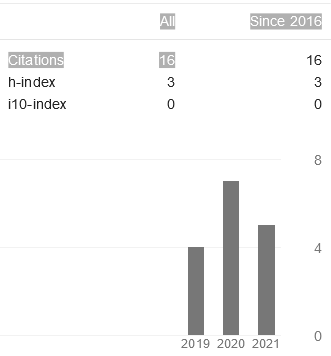The Effectiveness of Expressive Writing Therapy on Expressing Angry Emotional Expressions of MTS Safindah Surabaya Students
Abstract
Anger is an emotional reaction to what is felt internally and externally. Factors forming angry emotions include: 1) Fear, 2) Insecurity, 3) Hurt, 4) Disappointed self-esteem, 5) Feelings of being unappreciated. The characteristics of angry expression are divided into three forms, namely: 1) anger in, 2) anger out, 3) anger control. The subjects of this intervention were the students of MTS Safindah. The intervention that can be given to angry students is expressive writing therapy with the hope that it can reflect the innermost thoughts and feelings of unpleasant events in the form of handwritten language. The purpose of this study was to determine the forms of angry emotional behavior, and to determine the effectiveness of expressive writing therapy on the angry emotions of MTS Safinda
students. This study used Quasy Experiment Design with One Group pretest posttest design with random group selection. The scale used in this study is the State-Trait Anger Expression Inventory (STAXI) developed by Spielberger which consists of three indicators, namely anger in, anger out, anger control. Based on the interventions that have been carried out, the results of the hypothesis indicate that the Expressive Writing Therapy intervention can reduce the expression of negative angry emotions in Safindah's MTS students, so that Safindah's MTS students are able to improve control over the expression of anger.
Copyright (c) 2023 Fatiha Ainur Rofi’ah, Nadhifah Amalia Cahyanto, Nadia Afif Faida, Tiara Cindy Lestari, Rizma Fitri

This work is licensed under a Creative Commons Attribution-ShareAlike 4.0 International License.
Authors who publish with us agree to the following terms:
- Authors retain copyright and grant the publisher right of first publication with the work simultaneously licensed under a Creative Commons Attribution License that allows others to share the work with an acknowledgement of the work's authorship and initial publication in this proceeding.
- Authors are able to enter into separate, additional contractual arrangements for the non-exclusive distribution of the proceeding's published version of the work (e.g., post it to an institutional repository or publish it in a book), with an acknowledgement of its initial publication in this proceeding.
- Authors are permitted and encouraged to post their work online (e.g., in institutional repositories, pre-prints sites or on their website) prior to and during the submission process, as it can lead to productive exchanges, as well as earlier and greater dissemination of published work





_page-00011.jpg)
